Yunnuo Xu
Robust Design for Multi-Antenna LEO Satellite Communications with Fractional Delay and Doppler Shifts: An RSMA-OTFS Approach
Dec 16, 2025Abstract:Low-Earth-orbit (LEO) satellite communication systems face challenges due to high satellite mobility, which hinders the reliable acquisition of instantaneous channel state information at the transmitter (CSIT) and subsequently degrades multi-user transmission performance. This paper investigates a downlink multi-user multi-antenna system, and tackles the above challenges by introducing orthogonal time frequency space (OTFS) modulation and rate-splitting multiple access (RSMA) transmission. Specifically, OTFS enables stable characterization of time-varying channels by representing them in the delay-Doppler domain. However, realistic propagation introduces various inter-symbol and inter-user interference due to non-orthogonal yet practical rectangular pulse shaping, fractional delays, Doppler shifts, and imperfect (statistical) CSIT. In this context, RSMA offers promising robustness for interference mitigation and CSIT imperfections, and hence is integrated with OTFS to provide a comprehensive solution. A compact cross-domain input-output relationship for RSMA-OTFS is established, and an ergodic sum-rate maximization problem is formulated and solved using a weighted minimum mean-square-error based alternating optimization algorithm that does not depend on channel sparsity. Simulation results reveal that the considered practical propagation effects significantly degrade performance if unaddressed. Furthermore, the RSMA-OTFS scheme demonstrates improved ergodic sum-rate and robustness against CSIT uncertainty across various user deployments and CSIT qualities.
Uplink Rate-Splitting Multiple Access for Mobile Edge Computing with Short-Packet Communications
Feb 07, 2025



Abstract:In this paper, a Rate-Splitting Multiple Access (RSMA) scheme is proposed to assist a Mobile Edge Computing (MEC) system where local computation tasks from two users are offloaded to the MEC server, facilitated by uplink RSMA for processing. The efficiency of the MEC service is hence primarily influenced by the RSMA-aided task offloading phase and the subsequent task computation phase, where reliable and low-latency communication is required. For this practical consideration, short-packet communication in the Finite Blocklength (FBL) regime is introduced. In this context, we propose a novel uplink RSMA-aided MEC framework and derive the overall Successful Computation Probability (SCP) with FBL consideration. To maximize the SCP of our proposed RSMA-aided MEC, we strategically optimize: (1) the task offloading factor which determines the number of tasks to be offloaded and processed by the MEC server; (2) the transmit power allocation between different RSMA streams; and (3) the task-splitting factor which decides how many tasks are allocated to splitting streams, while adhering to FBL constraints. To address the strong coupling between these variables in the SCP expression, we apply the Alternative Optimization method, which formulates tractable subproblems to optimize each variable iteratively. The resultant non-convex subproblems are then tackled by Successive Convex Approximation. Numerical results demonstrate that applying uplink RSMA in the MEC system with FBL constraints can not only improve the SCP performance but also provide lower latency in comparison to conventional transmission scheme such as Non-orthogonal Multiple Access (NOMA).
Distributed Rate-Splitting Multiple Access for Multilayer Satellite Communications
Jul 14, 2023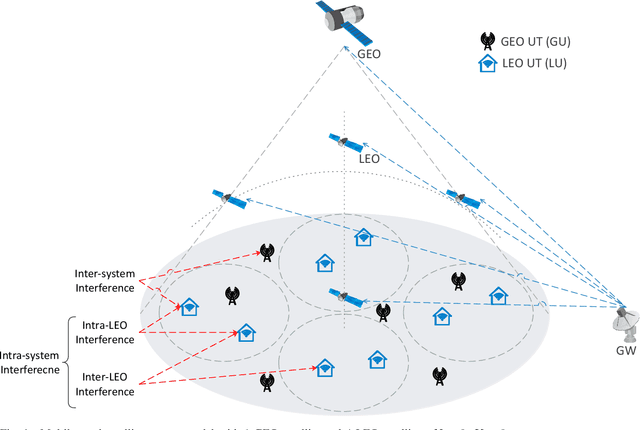
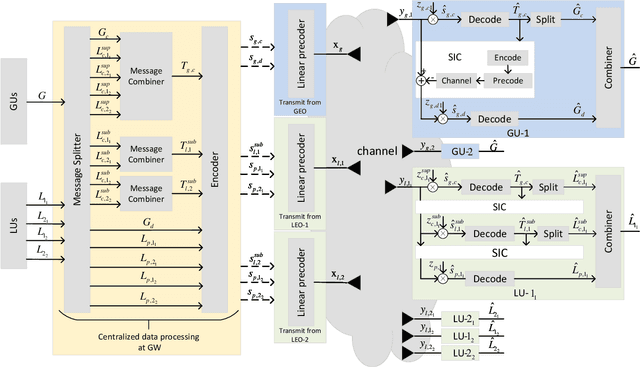
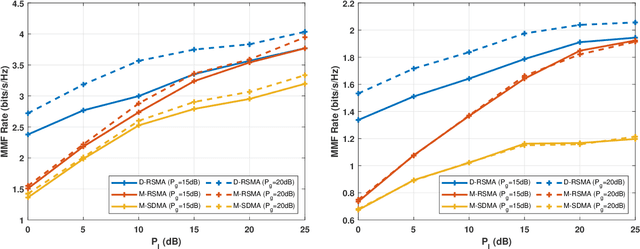
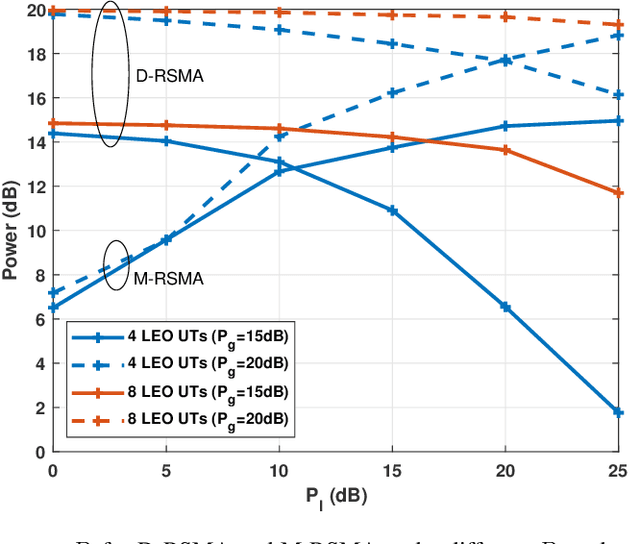
Abstract:Future wireless networks, in particular, 5G and beyond, are anticipated to deploy dense Low Earth Orbit (LEO) satellites to provide global coverage and broadband connectivity with reliable data services. However, new challenges for interference management have to be tackled due to the large scale of dense LEO satellite networks. Rate-Splitting Multiple Access (RSMA), widely studied in terrestrial communication systems and Geostationary Orbit (GEO) satellite networks, has emerged as a novel, general, and powerful framework for interference management and multiple access strategies for future wireless networks. In this paper, we propose a multilayer interference management scheme for spectrum sharing in heterogeneous GEO and LEO satellite networks, where RSMA is implemented distributedly at GEO and LEO satellites, namely Distributed-RSMA (D-RSMA), to mitigate the interference and boost the user fairness of the system. We study the problem of jointly optimizing the GEO/LEO precoders and message splits to maximize the minimum rate among User Terminals (UTs) subject to a transmit power constraint at all satellites. A Semi-Definite Programming (SDP)-based algorithm is proposed to solve the original non-convex optimization problem. Numerical results demonstrate the effectiveness and network load robustness of our proposed D-RSMA scheme for multilayer satellite networks. Because of the data sharing and the interference management capability, D-RSMA provides significant max-min fairness performance gains when compared to several benchmark schemes.
Max-Min Fairness of Rate-Splitting Multiple Access with Finite Blocklength Communications
Jul 12, 2022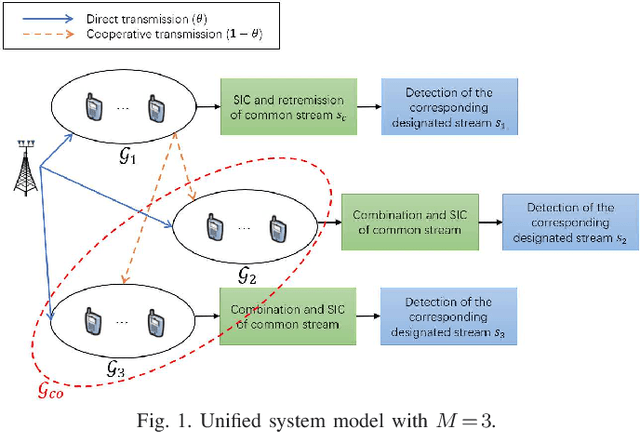
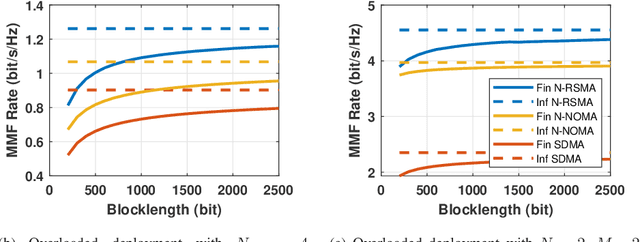
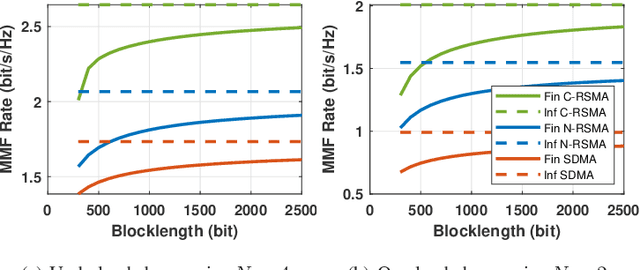
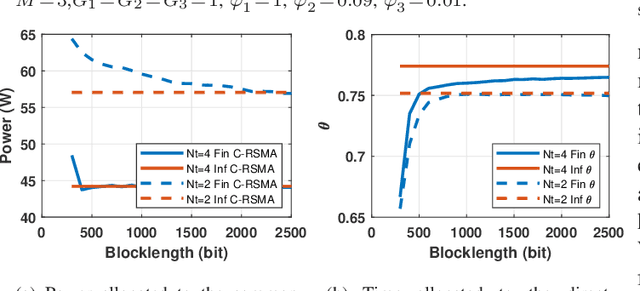
Abstract:Rate-Splitting Multiple Access (RSMA) has emerged as a flexible and powerful framework for wireless networks. In this paper, we investigate the user fairness of downlink multi-antenna RSMA in short-packet communications with/without cooperative (user-relaying) transmission. We design optimal time allocation and linear precoders that maximize the Max-Min Fairness (MMF) rate with Finite Blocklength (FBL) constraints. The relation between the MMF rate and blocklength of RSMA, as well as the impact of cooperative transmission are investigated for a wide range of network loads. Numerical results demonstrate that RSMA can achieve the same MMF rate as Non-Orthogonal Multiple Access (NOMA) and Space Division Multiple Access (SDMA) with smaller blocklengths (and therefore lower latency), especially in cooperative transmission deployment. Hence, we conclude that RSMA is a promising multiple access for guaranteeing user fairness in low-latency communications.
 Add to Chrome
Add to Chrome Add to Firefox
Add to Firefox Add to Edge
Add to Edge